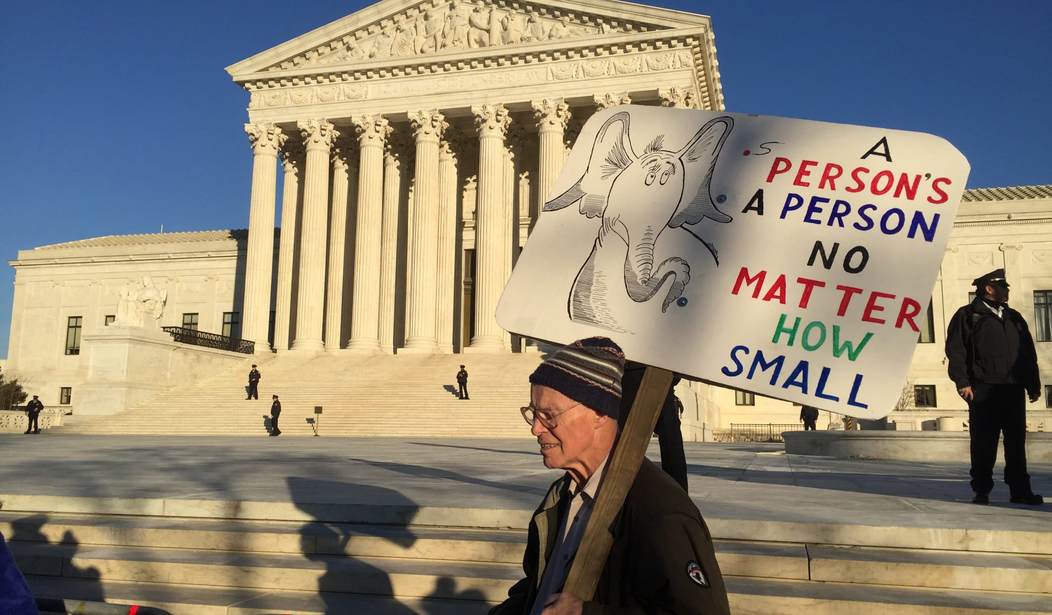On Friday, the U.S. Supreme Court announced it would consider two abortion cases consolidated into one. The cases center on Louisiana’s law requiring abortion clinics to have admitting privileges at a hospital within 30 miles. The case represents the first time the Court will consider an abortion case after the confirmations of Justices Neil Gorsuch and Brett Kavanaugh, giving the Court a conservative majority.
The Supreme Court granted certiorari to two cases: June Medical Services v. Gee, Secretary of the Louisiana Department of Health and Gee v. June Medical Services.
Abortion advocates claim that the law in question unfairly limits access to abortion, depriving women of a fundamental right as established in the case Roe v. Wade (1973) and later cases.
In 2016, the Court struck down a nearly identical Texas law by a vote of 5-3. Even so, the U.S. 5th Circuit Court of Appeals ruled that the Louisiana law was permissible because it would have a different impact than the Texas law.
“Here, unlike in Texas, the Act does not impose a substantial burden on a large fraction of women,” Circuit Judge Jerry Smith wrote.
While the Fifth Circuit would have allowed the Louisiana law to go into effect, the Supreme Court stepped in in February. Chief Justice John Roberts — a George W. Bush appointee now widely consider the Court’s swing vote — joined with liberals on the Court to put the law on hold.
Former Justice Anthony Kennedy was one of the five justices who ruled against the Texas law, and he has since been replaced with Kavanaugh. While liberals fought tooth and nail against Kavanaugh’s confirmation, it remains to be seen whether the newest justice will act against the precedents on abortion.
Misconceptions on Roe v. Wade and abortion law in general abound. A Marist poll this January found that almost two-thirds of Americans (65 percent) would support abortion restrictions that essentially overturn the Supreme Court precedents including and following Roe v. Wade.
Most Americans either wanted the Court to make abortion illegal (16 percent) or to “allow states to make certain restrictions” (49 percent). Both of these outcomes would effectively overturn Roe v. Wade.
Fewer than a third of Americans (30 percent) said abortion should be “legal without restriction.” Another 6 percent admitted they were unsure.
The KOC/Marist poll found that even though 55 percent of Americans identify as “pro-choice,” strong majorities of Americans in each party would restrict abortion to the first three months of pregnancy, or to cases of rape and incest or to save the life of the mother.
A full 60 percent of Democrats, 92 percent of Republicans, and 72 percent of independents support this kind of abortion restriction.
Under the Supreme Court’s 1973 decision, upheld in later rulings, the states cannot have their own restrictions on a woman’s constitutional right to abortion up until the point of viability outside the womb. This does not square with the opinions of most Americans, whether or not they would explicitly advocate for Roe v. Wade to be repealed.
Yet many Americans have a positive view of the term Roe v. Wade, thanks to a longtime campaign of Planned Parenthood and other activist groups presenting the decision as a victory for women’s rights.
News this year has put current American law on the issue in stark relief, as New York passed a law codifying Supreme Court precedent on Roe and Gov. Ralph Northam (D-Va.) defended the practice of infanticide in cases of babies surviving abortion. Under Roe and other abortion cases, restrictions on abortion after the second trimester are permitted if a doctor certifies that the mother’s life or health are at risk. The “health” exemption as defined in the case Doe v. Bolton (1973) is extremely broad, including mental and emotional health, often an excuse for elective abortion.
These radical positions are far outside the American mainstream, and it is long past time the Supreme Court reconsider its precedents on abortion. Activists are likely to scream that any restrictions on abortion are bringing about The Handmaid’s Tale, but nothing could be further from the truth.
Follow the author of this article on Twitter at @Tyler2ONeil.









Join the conversation as a VIP Member